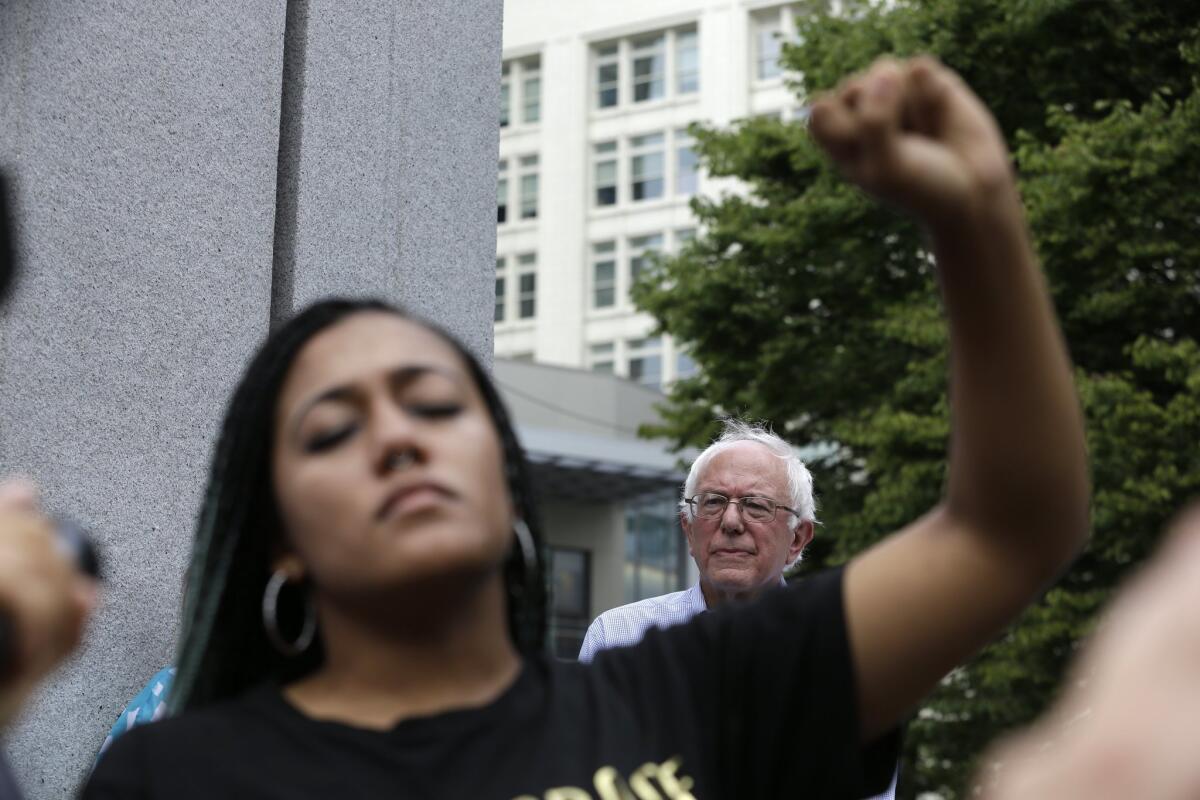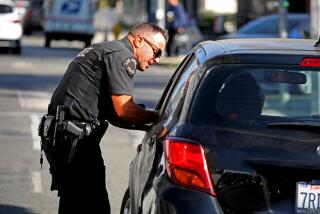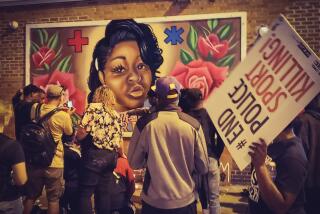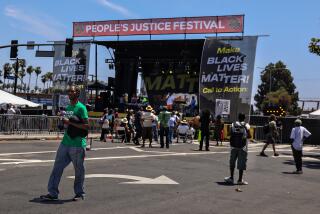Activists come up with a plan to end police killings. Here it is.

Mara Jacqueline Willaford, a Black Lives Matter activist, holds her fist overhead as Democratic presidential candidate Sen. Bernie Sanders stands nearby at a rally in downtown Seattle.
Have a plan, she said. On Aug. 11, Democratic presidential hopeful Hillary Rodham Clinton spoke privately with a group of Black Lives Matter protesters who had tried to disrupt one of her campaign events in New Hampshire.
Clinton said raising awareness about inequality would not be enough -- there should be a specific vision to improve the lives of black Americans.
“You’re gonna have to come together as a movement and say, ‘Here’s what we want done about it,’ ” Clinton said, according to a video of the encounter, adding: “That’s what I would love to have your thoughts about, because that’s what I’m trying to figure out.”
On Friday, prominent black activists offered an answer that has been in the works for months, introducing a comprehensive policy platform to end killings by the police in the U.S. and said they will track and hold 2016 candidates accountable for their stances.
“Campaign Zero,” marks the most sweeping and detailed policy platform to emerge along with the Black Lives Matter movement. On a slickly produced website, it proposes 10 reform tenets, many backed with specific policy proposals to end the hundreds of police killings that happen annually in the U.S.
The campaign’s pillars include limiting police use of force, beefing up oversight of police departments with civilian review boards and equipping officers with body cameras. The activists call for an end to aggressive police tactics and heavy fines when it comes to minor infractions that tend to fall disproportionately on black Americans.
The group also adopted model police programs and proposals from around the country. A call to end police ticket quotas points to Illinois law as a reference. A proposal to restrict the use of SWAT teams except for crisis situations cites Cincinnati police policy. One proposal to strengthen oversight suggests supporting an existing congressional bill that would incentivize independent investigations of police misconduct.
Campaign Zero was created by DeRay Mckesson, Johnetta Elzie, Brittany Packnett -- three of the most prominent activists to emerge during last year’s unrest in Ferguson, Mo. -- and Samuel Sinyangwe, a San Francisco-based policy expert.
“We’ve always had demands,” said Mckesson, who shared the proposals with the hundreds of thousands of Twitter followers he has amassed since the protests in Ferguson. He said Campaign Zero has collected those demands made by various activists around the U.S. as police use of force has become a fixture of public debate.
“Now that there’s this awareness, we have an opportunity to end police violence, and this is a blueprint for how we can do it,” Mckesson said.
Protesters associated with the national movement that emerged after the protests in Ferguson have been criticized in recent months for carrying out disruptive demonstrations but not engaging as much with the less dramatic processes of policymaking.
Other modern, social-media driven movements in the U.S. and abroad have come under similar criticisms. There were Occupy Wall Street’s leaderless, often directionless protest encampments and the Tahrir Square activists in Egypt who proved influential on Twitter but powerless at the ballot box.
The term “Black Lives Matter” has also drawn some confusion because it is a decentralized organization that also serves as a rallying cry and a hashtag -- and now a quick media shorthand to collectively refer to the new generation of black activists.
The founders of Campaign Zero, although they do not call themselves leaders and don’t claim to speak for others, include activists who have accumulated power and influence in the form of large social media followings and I-was-there credibility.
As a result, they have drawn the attention of presidential campaigns undoubtedly hoping to secure votes from African Americans in the next election.
On Monday, Mckesson tweeted at U.S. Sen. Bernie Sanders’ official account to ask, “The first draft of your racial justice platform has promise. When will you be available to discuss enhancements w/ folks?”
Sanders’ account responded, “Let’s do it. We will [private message] you this week to arrange.”
“We’ve spoken to staffers on [former Maryland Gov. Martin] O’Malley’s campaign, on Hillary’s campaign, and Sanders’, maybe all within the last two weeks or so,” said Elzie, who has 71,000 Twitter followers. “The lines of communication are open for sure.”
The activists behind Campaign Zero were quick to say that they were not representative of the whole movement but that they had also solicited suggestions from other activists and would be open to changes in their platform.
Elzie added, “The four of us can’t speak for every black person in America.” However, she added, “As cliché as the phrase is, knowledge really is power in this case. I want people to make the best-informed decisions for themselves and their community, and I think Campaign Zero definitely helps.”
For instance, Elzie said, she scrolled over the Campaign Zero table showing presidential candidates and whether they’d taken a specific stand on the activists’ 10 core issues. The Democratic candidates had many boxes filled in with positions, but the Republicans’ were empty.
“It maps out plain as day who has spoken on what,” Elzie said. “Just looking at this chart, the Republicans have said nothing about anything that remotely affects what’s happening in America right now.”
It’s a tool, Packnett added, to “ultimately hold the 2016 candidates accountable.”
Follow @MattDPearce for national news
ALSO:
Analysis: Shaun King is no Rachel Dolezal: Look who’s calling him white
House lawsuit against Obama is turning into a real problem for the president
Police chief says autopsy shows black Missouri 18-year-old was shot in the back
More to Read
Start your day right
Sign up for Essential California for news, features and recommendations from the L.A. Times and beyond in your inbox six days a week.
You may occasionally receive promotional content from the Los Angeles Times.







